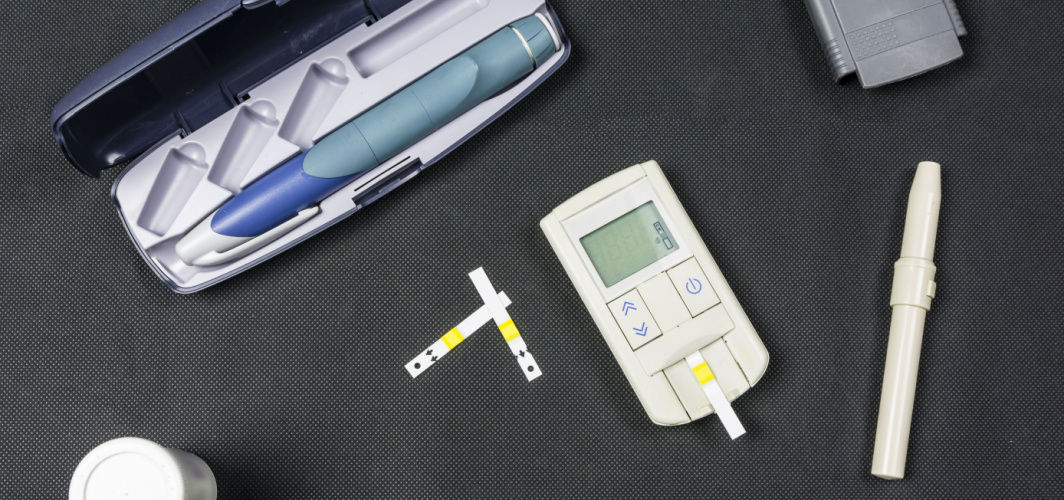Diabetes Management
What Do Diabetes Test Packages Include?
8 min read
By Apollo 24|7, Published on - 27 June 2023, Updated on - 04 September 2023
Share this article
0
0 like

Different types of blood tests are used to confirm the diagnosis of diabetes. Various blood tests such as HbA1C levels, glucose random, glucose pp, insulin random, and others are usually recommended by doctors to determine the blood glucose levels of a person at risk of developing diabetes. Read to know which tests should be included in diabetes diagnostic packages.
Who Should Take Diabetes Diagnostic Packages?
Anyone can take diabetes diagnostic packages, however, those who must not avoid it include:
- Individuals who are at risk of developing diabetes, such as those with a family history of the disease, obesity, or lead a sedentary lifestyle.
- People who have been diagnosed with diabetes, be it type 1 or type 2, can benefit from the diabetes package. It can help them manage their blood sugar levels and prevent complications associated with diabetes, such as heart disease, kidney failure, and blindness.
Why is the Diabetes Test Package Prescribed?
The diabetes test package is prescribed to help diabetics manage their condition efficiently. A diabetes test package can help:
- Monitor blood glucose levels: Regular monitoring of blood glucose levels is essential to manage diabetes efficiently.
- Prevent complications: Diabetes can lead to serious complications such as heart disease, kidney failure, nerve damage, blindness, and hearing loss. Keeping a constant check on your blood glucose levels can help prevent these complications.
- Monitor the treatment plan: By keeping a check on your blood glucose levels, the doctors can help determine the effectiveness of the current treatment plan and modify it, if needed.
When selecting a lab provider for a diabetic diagnostic package, ensure that you verify the credibility of provider for accurate results.
What Tests are Included in a Diabetes Test Package?
The following tests are included in the diabetes diagnostic package:
1. Glucose fasting
A glucose fasting test measures blood glucose levels after an individual has fasted for at least 8 hours. A fasting blood glucose level has these ranges:
- Normal- 99 mg/dL
- Pre-diabetes- 100- 125 mg/DL
- Diabetes- 126 mg/dL or higher
2. Glucose random
A random glucose test estimates blood glucose levels at any time of the day, regardless of when the individual last ate. Generally, blood glucose monitoring devices are used for checking the glucose level.
A random blood glucose level of 200 mg/dL or higher, along with symptoms of diabetes, such as increased thirst and frequent urination, is indicative of diabetes.
3. Glucose post-prandial test
Glucose pp evaluates the blood glucose levels after a meal, usually 2 hours of eating. Apart from glucose monitoring kits, a diabetic person can also use a continuous glucose monitoring device, which examines the blood glucose levels and determines how well their body is processing glucose after a meal.
4. Insulin test
There are three types of insulin tests that can be recommended to a diabetic or prediabetic:
- Insulin fasting: The insulin fasting test requires the person to fast for 8 hours and measures the level of insulin in the blood after fasting. This test helps diagnose insulin resistance and functioning of insulin therapy.
- Insulin pp: This insulin post-prandial test is used to measure the level of insulin in the blood after consumption of food, usually after 2 hours. It monitors the efficiency of insulin therapy in diabetics along with the processing of glucose after the consumption of food.
- Insulin random: The insulin random test checks the level of insulin in the blood at any time of the day. This test is done to diagnose insulin resistance and monitor insulin therapy.
5. Urine Test
To confirm the diagnosis of diabetes, the doctors may also recommend a urine test. The urine glucose test can either be performed at a hospital or even at your home. The procedure requires a urine sample, a container to collect urine and a urine glucose test strip. The two types of urine tests used to diagnose diabetes include:
- Urine Glucose Fasting: In the urine glucose fasting test, the midstream urine sample (the first urine of the morning leaving the first and last part of the urine stream) is collected in a container. Then, urine glucose test strips are dipped into the sample. A change in color indicates diabetes mellitus.
- Urine Glucose pp: The urine glucose pp test is performed to analyze the amount of glucose present in urine after 2 hours of consumption of a meal. The presence of glucose in the urine may be suggestive of diabetes.
Doctors may also use a ketone testing kit to determine the presence of ketone bodies in the urine. A high ketone level in the urine is an indication of one of the most common complications of diabetes, i.e. diabetic ketoacidosis (DKA).
6. HbA1c, glycated hemoglobin
Haemoglobin A1c or HbA1c test measures the average blood glucose levels over the past 2-3 months. This test calculates the percentage of glucose attached to the hemoglobin to form glycated hemoglobin. It is done by using A1c testing kits and requires a blood sample. An HbA1c level of 6.5% or more indicates diabetes.
Apollo's Diabetes Diagnostic Health Packages
Apollo’s expert doctors have curated three different packages (basic, essential, and advanced) to monitor diabetes and other health problems associated with the condition. Let's know about them in brief:
1. Apollo Diabetes Panel - Basic
Apollo Diabetes Panel - Basic includes 51 tests including, CBC (Complete Blood Count), LFT (Liver Function test), serum electrolyte, glucose fasting, glucose random and others. This test not only detects and monitors diabetes but also identifies whether you are at risk of developing other diseases because of diabetes.
2. Apollo Diabetes Panel - Essential
Apollo Diabetes Panel - Essential comprises 74 tests in total, including CBC (Complete Blood Count), fasting Glucose, Glucose pp, HbA1c, urine examination, Lipid Profile Test, and others to examine diabetes. If you have a history of high bp, heart-related disorder, or are experiencing numbness in your feet and hands, this test can help provide you with an accurate medical analysis of your problem.
3. Apollo Diabetes Panel - Advance
Apollo Diabetes Panel - Advance has 78 total tests, which include CBC, fasting Glucose, Glucose PP HbA1c, LFT, cholesterol, Vitamin B12, Vitamin D test, Complete Urine Examination, and many more. Diabetes can cause several complications and put your kidney, liver, and heart at risk. This panel helps evaluate the health of these vital organs.
Conclusion
The diabetic diagnostic health package is a comprehensive approach to detecting and managing diabetes. This test can help detect diabetes at an early stage if you are a prediabetic or have a family history of diabetes. Moreover, these tests can help diabetics keep their blood sugar levels stable. You can now book the diabetes panel tests from the Apollo 24|7 app to detect diabetes timely and prevent its complications.
FAQs
Q. How is a glucose random test done?
A glucose random test doesn't need some special preparations. It is done by just pricking your finger to extract a single drop of blood, which is placed on the test strip to get the glucose reading. Normally, a reading of a sugar level of 140 mg/dL or less is considered normal.
Q. Are the diabetic diagnostic packages covered by insurance?
The coverage of the diabetes diagnostic package may vary depending on the insurance provider. It is important to check with the insurance provider to determine what services and devices are covered under the policy.
Q. How much does a diabetes diagnostic health package cost?
Well, there are various health packages as per the need of the individual, starting from basic to advanced with different costs.
Q. What do I do if my HbA1c is raised?
The HbA1c test is a report of your blood glucose levels over the last 2-3 months. High HbA1c levels indicate high blood glucose levels, suggestive of diabetes. Visit your healthcare provider if your HbA1c is raised.
Q. How long do I need to fast for a glucose blood test?
Normally fasting of 8-12 hours is recommended for the patient going for a glucose blood test. Therefore, you should not eat or drink prior to your fasting glucose blood test.
Medically reviewed by Dr Sonia Bhatt.
Diabetes Management
Consult Top Diabetologists
View AllLeave Comment
Recommended for you

Diabetes Management
Smoothie Recipes for a Healthy Diabetic Diet
Incorporating nutritious and blood sugar-friendly smoothies into your diabetic diet can be an excellent way to replenish your body with essential vitamins and minerals. Try out our simple and tasty recipes. But remember, moderation is key while managing diabetes. Always consider consulting your doctor or dietitian when making changes in your eating habits.
.jpg?tr=q-80)
Diabetes Management
A Diabetic-Friendly Snack Which You Can Easily Carry With You?
Managing diabetes doesn't mean you must forgo tasty snacks. There are numerous diabetic-friendly snacks available, full of flavour yet low in glycemic index. Healthy snacking can help regulate your blood sugar levels throughout the day. From nuts and seeds to fruits and smoothies, the list is long and diverse. The best snacks for diabetics are not only healthy but also easy to carry wherever you go. And remember, always consult your doctor before making any changes to your diet.
.jpg?tr=q-80)
Diabetes Management
Benefits of Broccoli for Individuals with Diabetes
Broccoli offers multiple benefits for individuals with diabetes, from blood sugar control to antioxidant properties and weight management support. With its low-calorie content, this nutrient-dense vegetable could be a staple in your diet. Coupling it with comprehensive programmes like Apollo Super 6 can help streamline your diabetes management journey.
Subscribe
Sign up for our free Health Library Daily Newsletter
Get doctor-approved health tips, news, and more.
Visual Stories

8 Fruits That are Incredibly Healthy for Diabetes
Tap to continue exploring
Recommended for you

Diabetes Management
Smoothie Recipes for a Healthy Diabetic Diet
Incorporating nutritious and blood sugar-friendly smoothies into your diabetic diet can be an excellent way to replenish your body with essential vitamins and minerals. Try out our simple and tasty recipes. But remember, moderation is key while managing diabetes. Always consider consulting your doctor or dietitian when making changes in your eating habits.
.jpg?tr=q-80)
Diabetes Management
A Diabetic-Friendly Snack Which You Can Easily Carry With You?
Managing diabetes doesn't mean you must forgo tasty snacks. There are numerous diabetic-friendly snacks available, full of flavour yet low in glycemic index. Healthy snacking can help regulate your blood sugar levels throughout the day. From nuts and seeds to fruits and smoothies, the list is long and diverse. The best snacks for diabetics are not only healthy but also easy to carry wherever you go. And remember, always consult your doctor before making any changes to your diet.
.jpg?tr=q-80)
Diabetes Management
Benefits of Broccoli for Individuals with Diabetes
Broccoli offers multiple benefits for individuals with diabetes, from blood sugar control to antioxidant properties and weight management support. With its low-calorie content, this nutrient-dense vegetable could be a staple in your diet. Coupling it with comprehensive programmes like Apollo Super 6 can help streamline your diabetes management journey.
